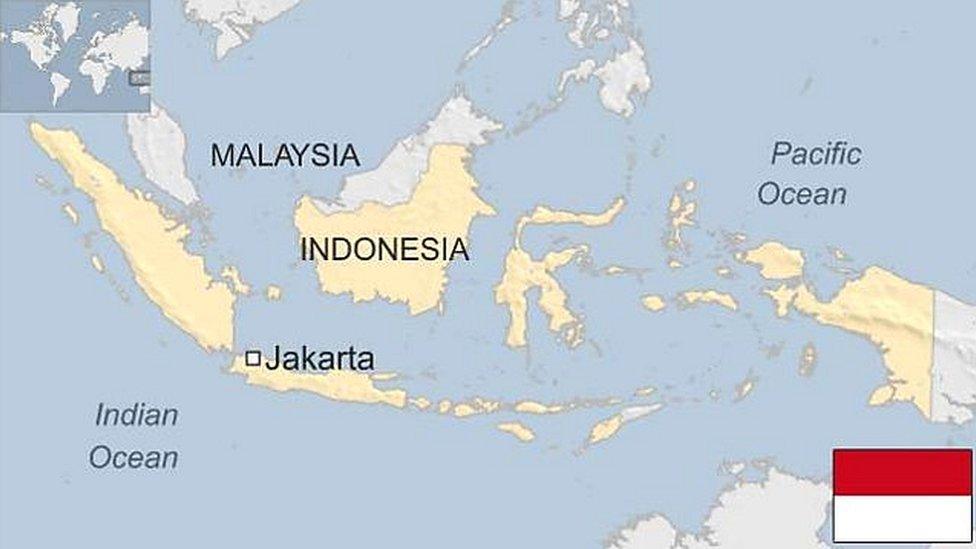Can Indonesia's forest fires be put out for good?
- Published
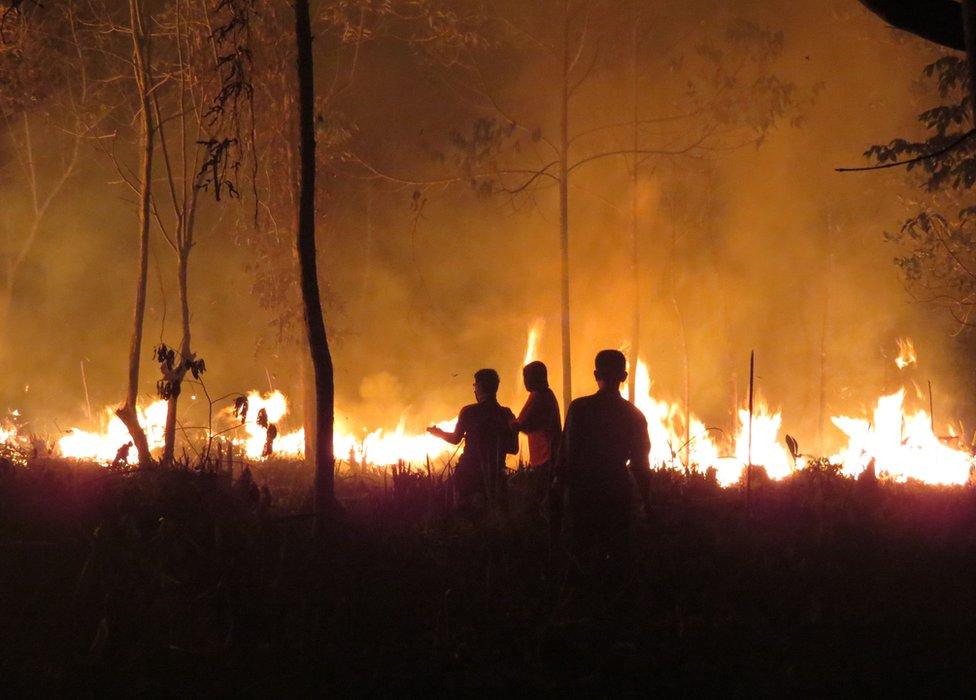
For about 20 years, Indonesia's mostly man-made forest fires have generally started up around March and blazed on and off until October as land is cleared for agriculture
Indonesia's so-called fire season last year was one of the worst on record, but the fires are back and burning out of control with a state of emergency already declared in one province.
Between about June and October, more than 100,000 fires burned down millions of hectares of fragile forest lands.
There were human and animal fatalities, and the economic damage was estimated to be more than $15bn (£10bn).
For more than 20 years these fires have been an annual occurrence, as farmers and agricultural companies clear Indonesia's forests and carbon-rich peatlands to make way for pulpwood, palm oil and rubber plantations, or for smaller scale subsistence farming.
But the fires have been getting gradually worse. Last year, the fires were so bad, that parts of Indonesia, together with cities across South East Asia, were blanketed in a thick toxic haze for weeks at a time.
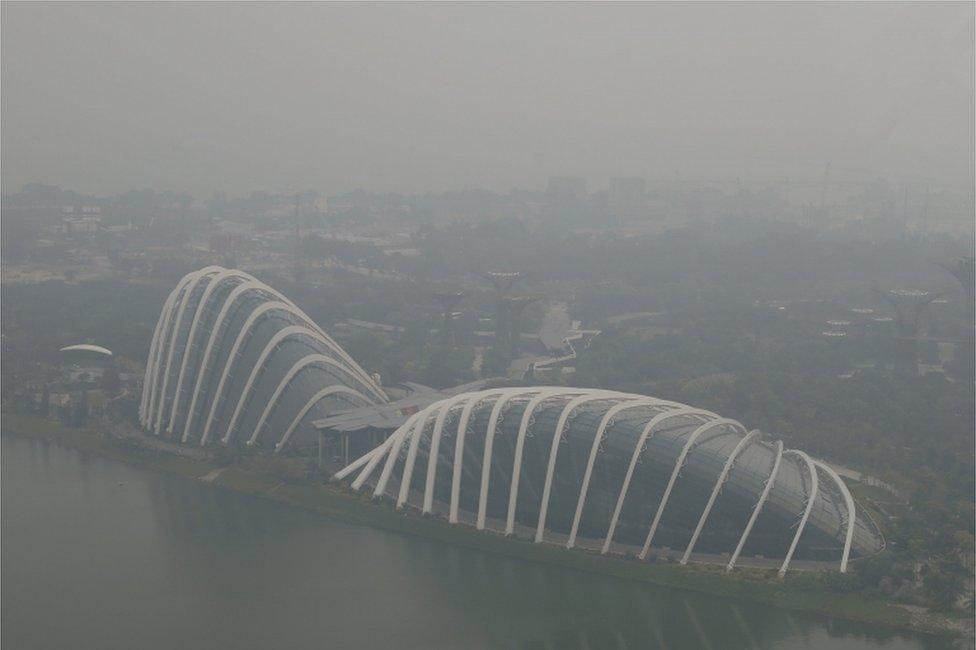
Some of Singapore's key tourist attractions like Gardens by the Bay were choked with haze last year
Half a million people were hospitalised due to the haze, and it was estimated that in those five months about 1.7 billion tonnes of carbon - roughly equivalent to what Brazil produces in a year - had been released into the atmosphere.
Indonesia promised that it would do more to prevent the fires from returning in 2016.
But the fires are back already - and now burning out of control.
A state of emergency has been declared in the western province of Riau, on the Indonesian island of Sumatra, and the army and police have been called in to try to fight the blazes.
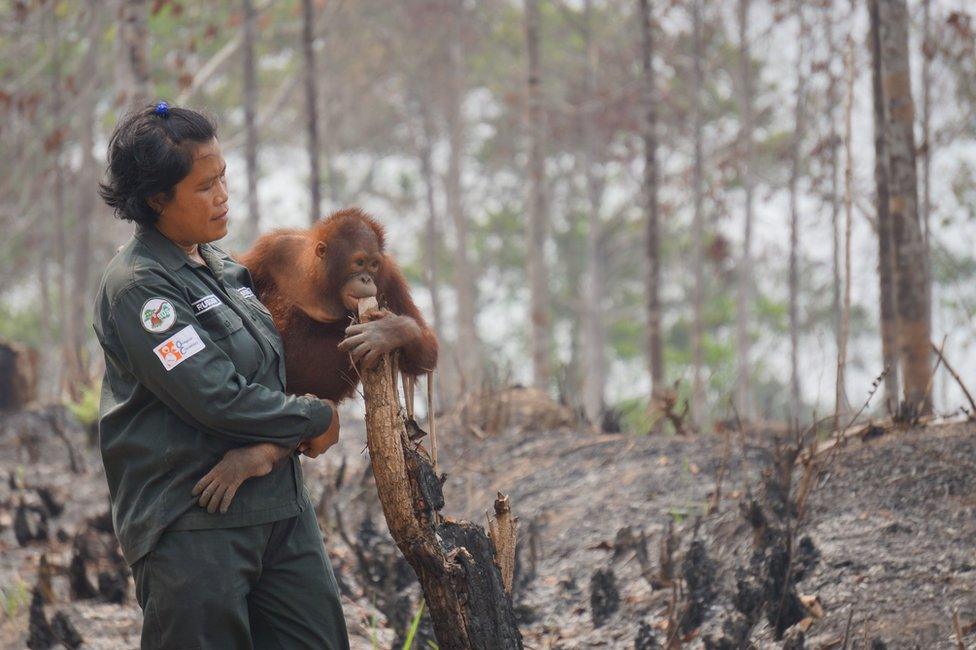
More than 200 orangutans were evacuated after the 2015 fires spread to their forest reserve
So what more can the Indonesian government do?
What is causing the fires?
Indonesia's government owns the majority of the country's forest land. It provides grants or concessions to small scale farmers and to large companies.
In the 1980s burning forest areas to clear land for agriculture was sanctioned by the government, and today Indonesia has the highest rate of deforestation in the world.
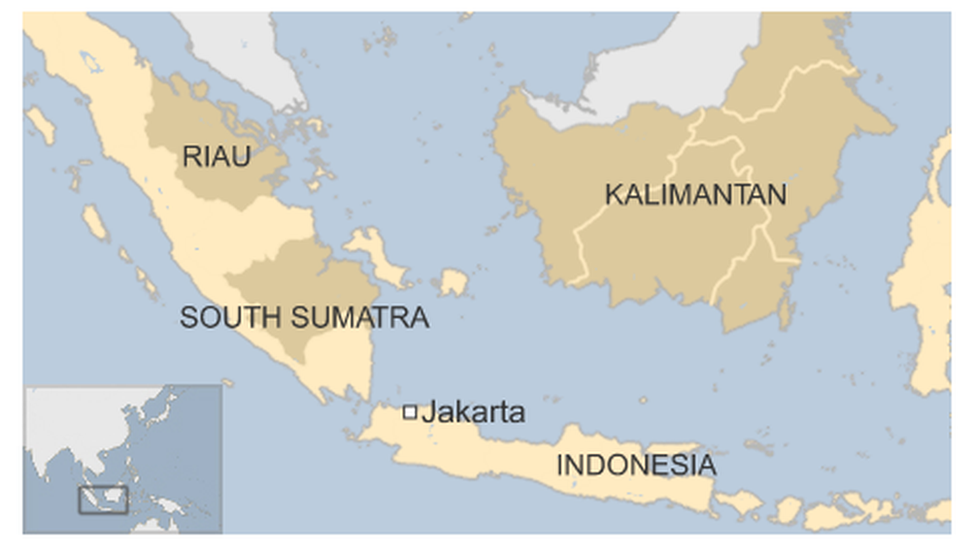
Fires are currently burning in Riau and East Kalimantan. A state of emergency has been called in Riau
For the last two decades, however, it has been against the law to clear more than two hectares of land each year, and using slash-and-burn methods for clearing is illegal.
But large companies have been accused of paying off small farmers for the use of their concession land - sometimes with just cigarettes and clothes - and then asking those small farmers to clear it for them.

What is 'slash-and-burn'?
Farmers cut down forests and wild plants on their land, then set a fire to clear what remains
It is cheap and quick and some farmers believe they are ridding their land of diseases that could hurt their crops
Fires to clear land can spark wild fires and spread to carbon-rich peatlands
The peat fires release vast amounts of carbon emissions

How has Indonesia tackled its fires in the past?
Policing the companies and small farmers responsible for lighting fires has been a huge challenge, and the forestry industry is often described as being riddled with corruption.
Last year President Joko Widodo told the BBC that he had gone to great lengths to tackle the fires, including the deployment of more than 10,000 police and soldiers and water-bombing planes.
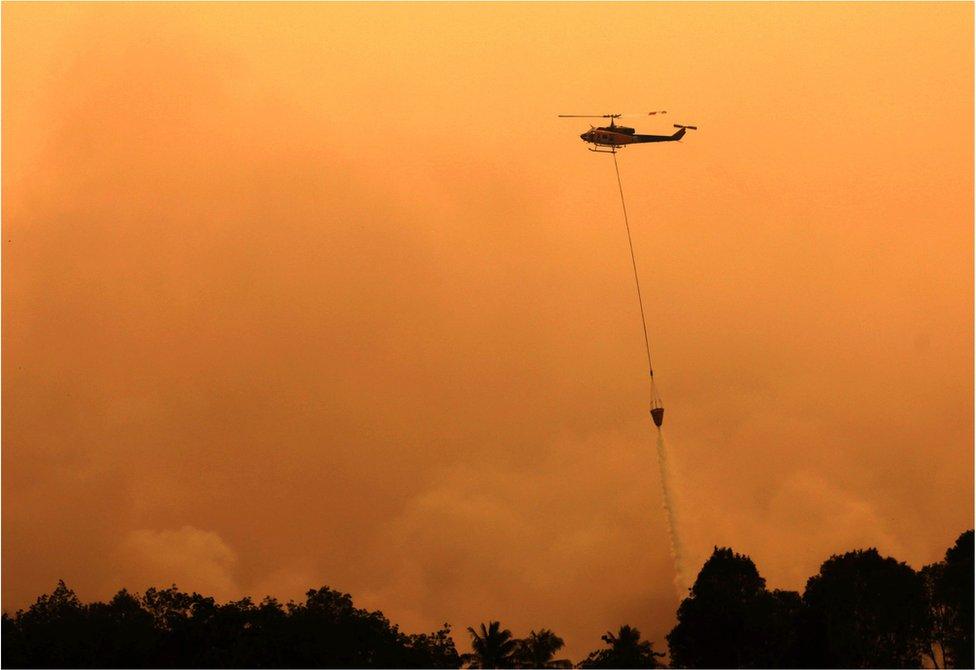
Helicopters in Indonesia water bombing areas on fire last year
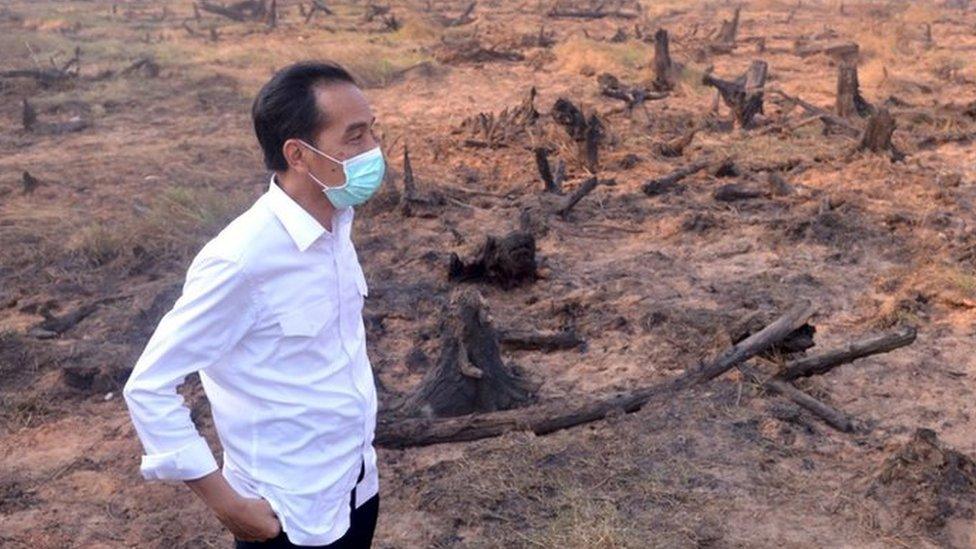
President Joko Widodo visited Central Kalimantan on Indonesian Borneo last year to see the scale of the burning
And Mr Widodo said further development of peatlands would be banned, and that, where possible, his country's carbon-rich lands should be restored.
But he also told the BBC it would take at least three years before the world would see significant improvements as a result of on-going efforts to control the fires.
When the fires restarted this year, Henry Purnomo, a scientist who works at the Centre for International Forestry Resarch (Cifor), an organisation which works closely with the government, said Indonesia was employing some of its best fire-prevention efforts to date. He says while the fires are not yet very big "we will need to move fast to suppress those fires burning now".
What is the government doing now?
Cifor's Mr Purnomo said environmental workers were out in the field doing their best to rehabilitate about 600,000 hectares of precious peatlands - with the aim of restoring some two million hectares in the coming years.
"There is a lot of important work being done by the government as well as the private sector, including the giant companies and the wood plantation companies - they are trying to work together," he said.
"And President Jokowi has said regional chiefs of police will be replaced if there are ongoing fires in their region."
In December last year, Indonesia announced that more than 50 companies would be punished for their role in the fires - and that further investigations were taking place.
Just weeks later, however, a $565m lawsuit against one plantation company was rejected due to lack of evidence.
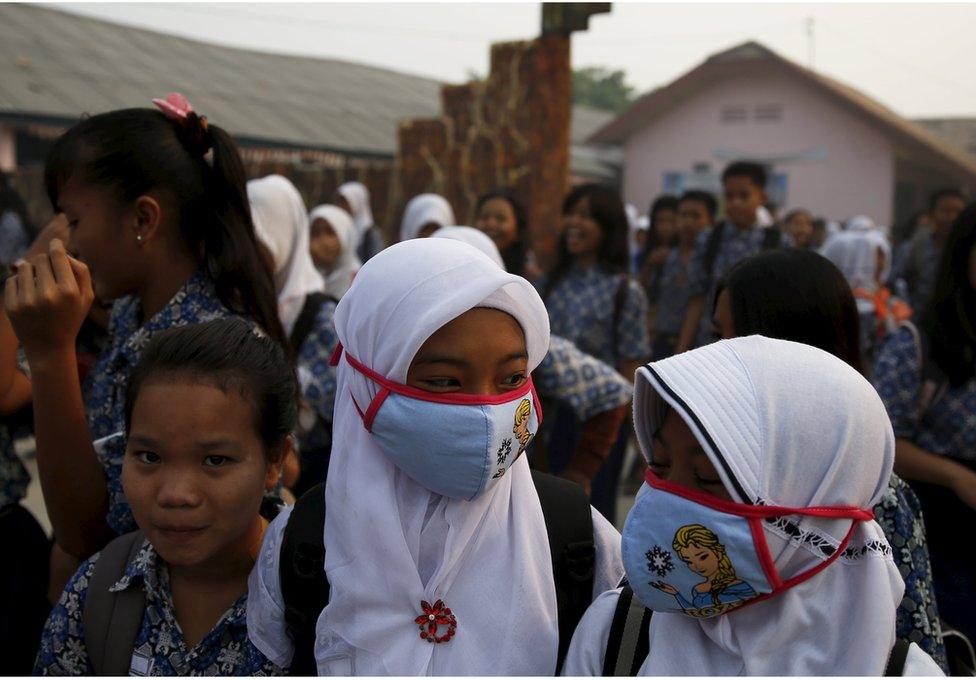
Face masks are a common sight in affected regions across Indonesia when the fires are burning
However Mr Purnomo said Indonesia's government was continuing to investigate companies with questionable operations.
But there still are concerns that directives from central government may be ignored locally.
Meanwhile, Indonesia's anti-corruption commission said it was encouraging local government agencies in affected areas to come together on prevention efforts and report illegal behaviour to the authorities.
But Dian Patria, acting director of research and development at Indonesia's Corruption Eradication Commission, says the biggest challenge is that no-one wants to be held responsible for the decades-old problem.
"There has been bad governance and bad management of the forests, based on our study of the last 12 years, and everyone says it is the fault of the previous minister, or previous governor," says Mr Patria.
"There are a lot of stakeholders - local government, public and also the licensees - they must be less corrupt and work with us to solve it right now. The private sector especially has to be responsible." he added.
"Many of the companies you must realise are based in Singapore and Malaysia too. They are not just Indonesian companies."
What more could be done?
Peter Holmgren, head of Cifor told the BBC that his teams are developing longer-term programmes to improve the situation.
But he said there were no quick or easy solutions.
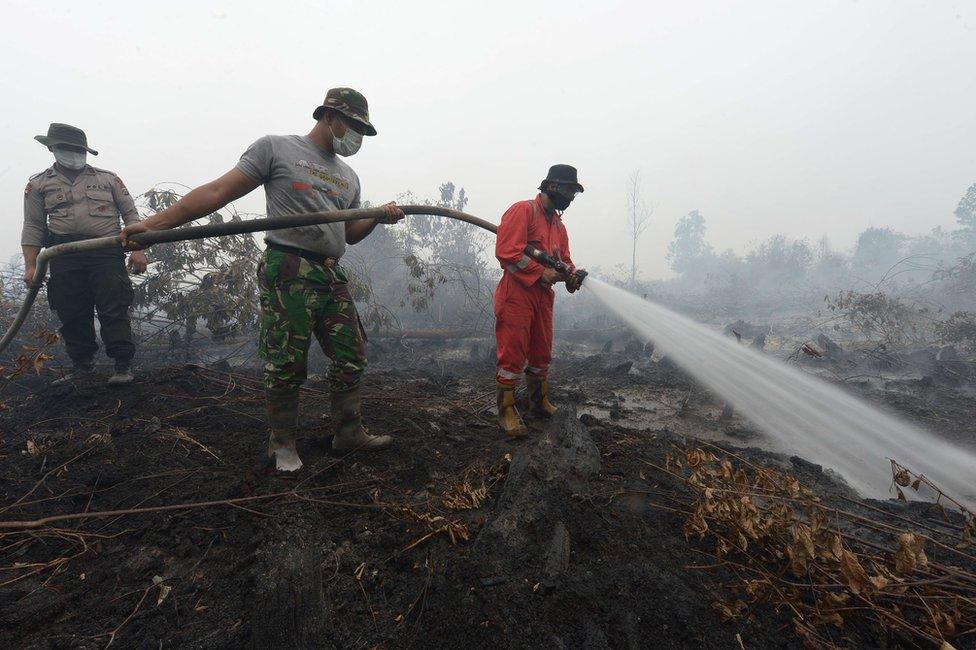
Dousing out a peat fire is difficult as it can burn underground, so the entire area needs to be swamped with water
"It's not a matter of putting the fires out today - it's a matter of changing how land is being used, how agriculture is being practised and how the opportunities for people's livelihood are developing," he said.
Mr Holmgren, who is based in Indonesia, but works across 45 countries in fire prevention and research, also said it was not just about providing aid to Indonesia or to poor farmers.
"It's obviously now primarily a matter of domestic policies and domestic regulations," he said.
"But... a lot of the activities that are going on are because there are investments in land conversion and development - and obviously those investments engage international financial institutions in different ways.
"So there are probably opportunities in looking at how the international finance system is regulating itself. And to look at the standards around which investments by large international institutions are being made."
Short and long-term targets
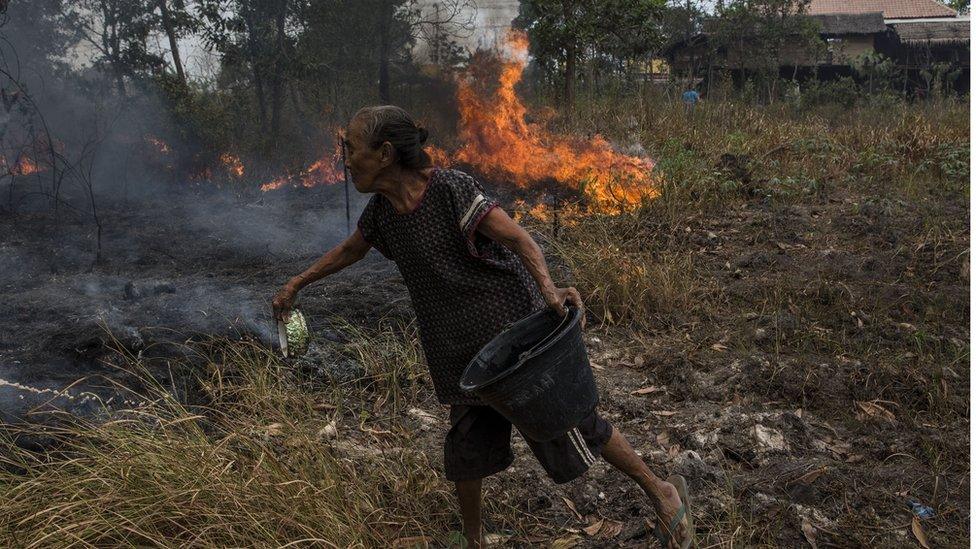
One of the biggest problems facing Indonesia is its inability to deal quickly with the fires at a local level
International forestry and fire fighting experts say one of the biggest problems facing Indonesia is its lack of fire-fighting know-how, particularly at a local level.
And fire prevention expert Tony Bartlett says wildfires, particularly forest fires, are an increasing problem as the impact of climate change increases.
Mr Bartlett who works for Australia's Centre for International Agricultural Research (ACIAR) says the international community can support Indonesia in tackling the blazes.
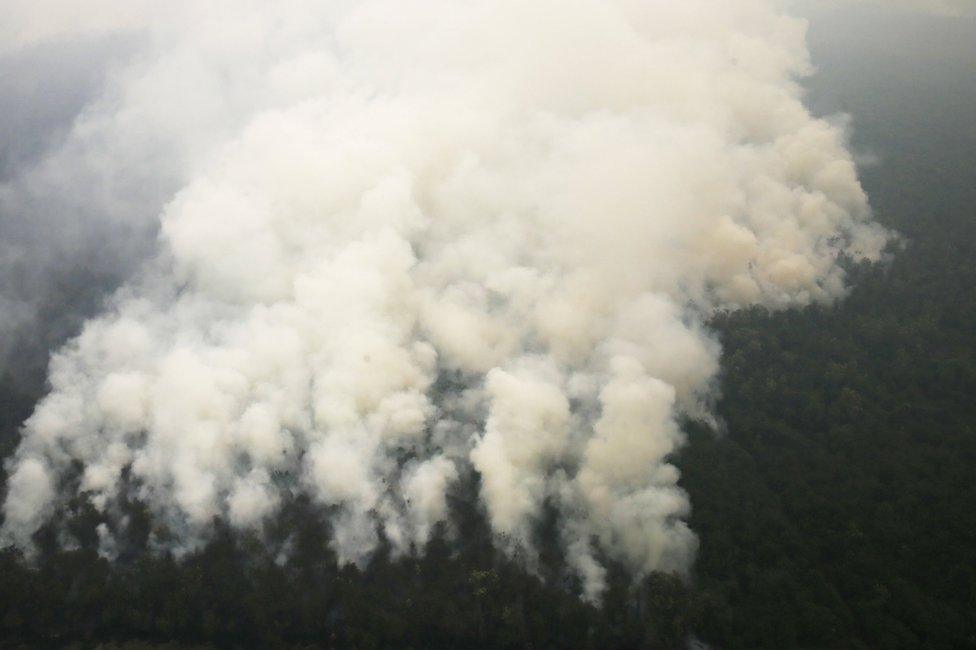
Forest fires are very different to fight compared to those on peatland, the experts say
He argues it is essential to quickly detect and respond to forest fires "with people that are well trained, properly managed and coordinated, and who can deal with different types of forest fires."
"But it's very difficult when you have peatland on fire," he said. "Forest fires look easy by comparison."
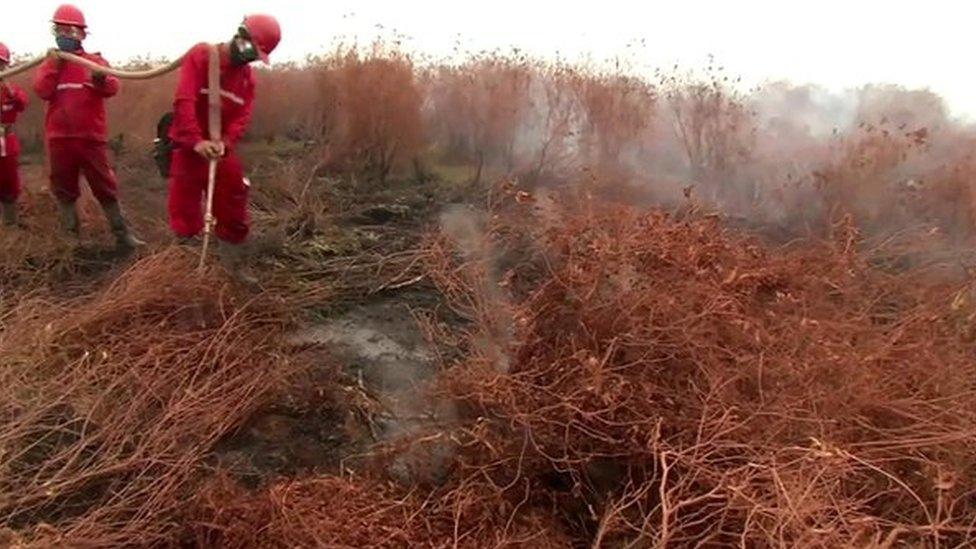
Fire fighters working hard to suppress a fire on a pulp and paper plantation in South Sumatra last year
In the longer term, Cifor's head Mr Holmgren says one solution would be to take agriculture away from peatland completely.
But he argues the root of the problem is the income insecurity of poor farmers and that tackling that should be the priority.
"The target is poverty," he says.
"The target is economic growth and inclusive green growth. And the target is food security," he added.
"If the issue is isolated to and portrayed as a climate change matter - and that's the story that everyone is hearing - then that is missing the target."
- Published31 December 2015
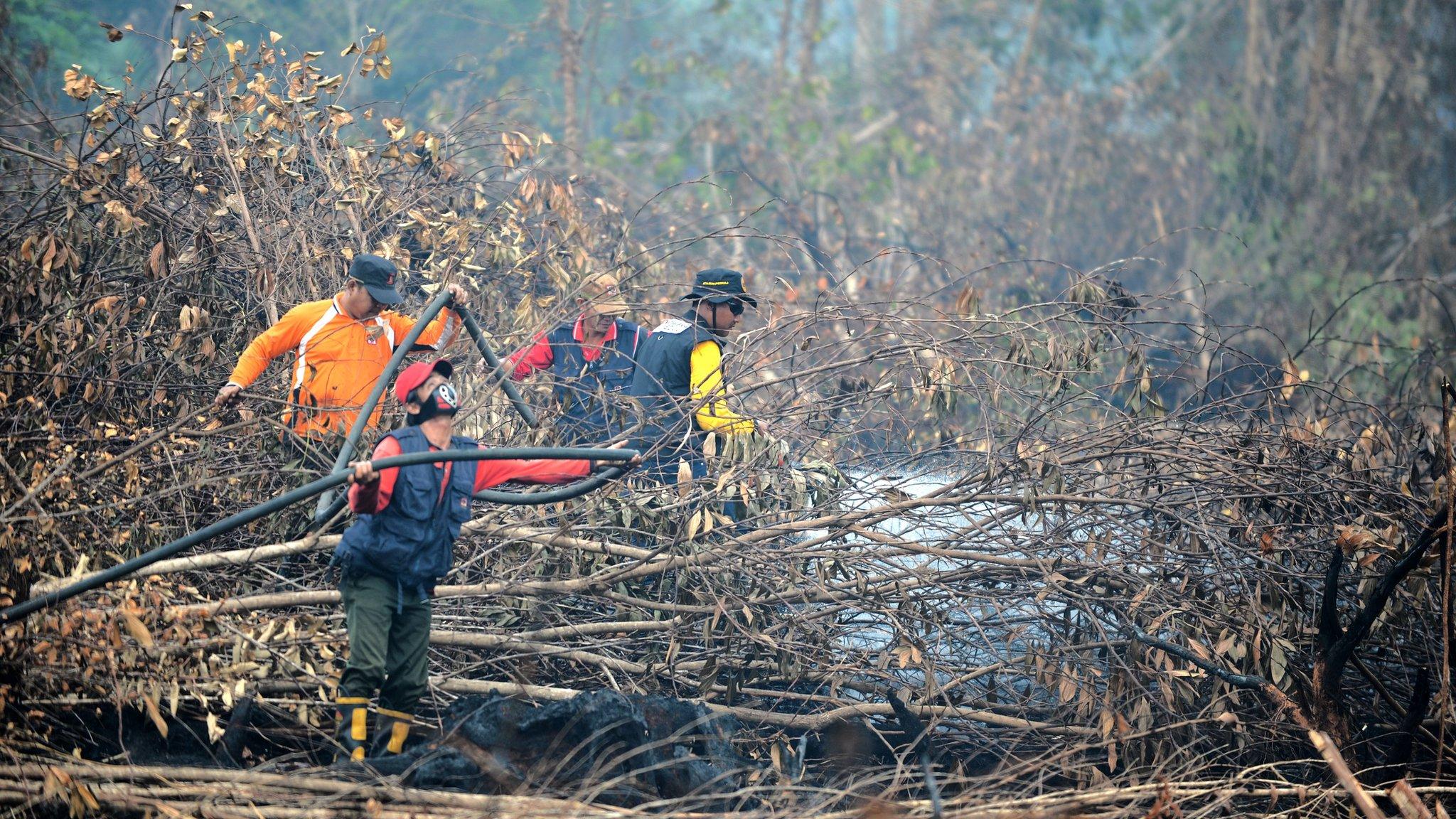
- Published10 November 2015

- Published16 September 2019
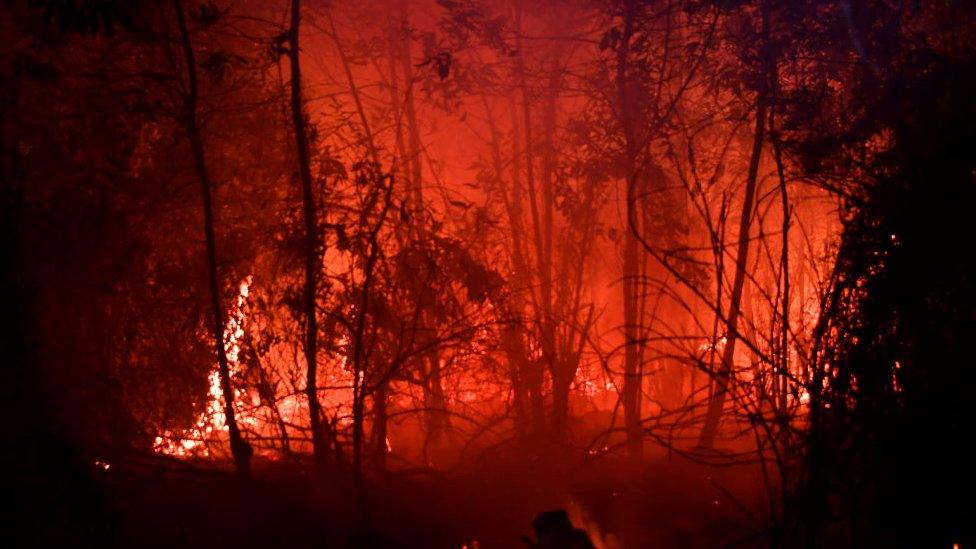
- Published8 October 2015
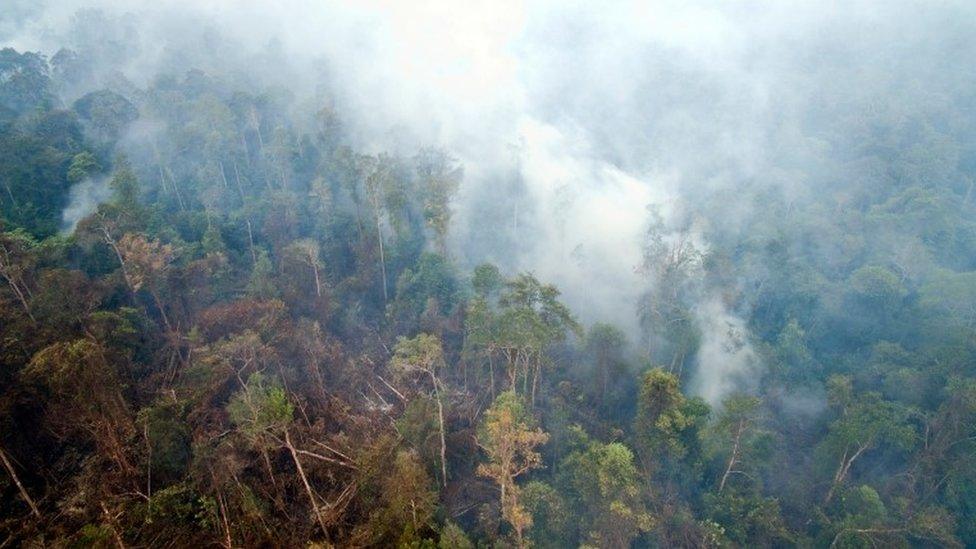
- Published23 September 2015
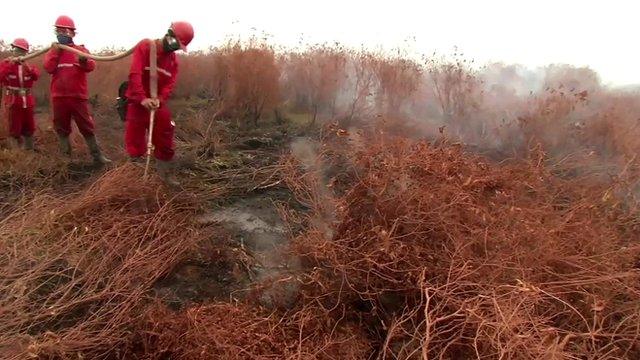
- Published24 June 2013
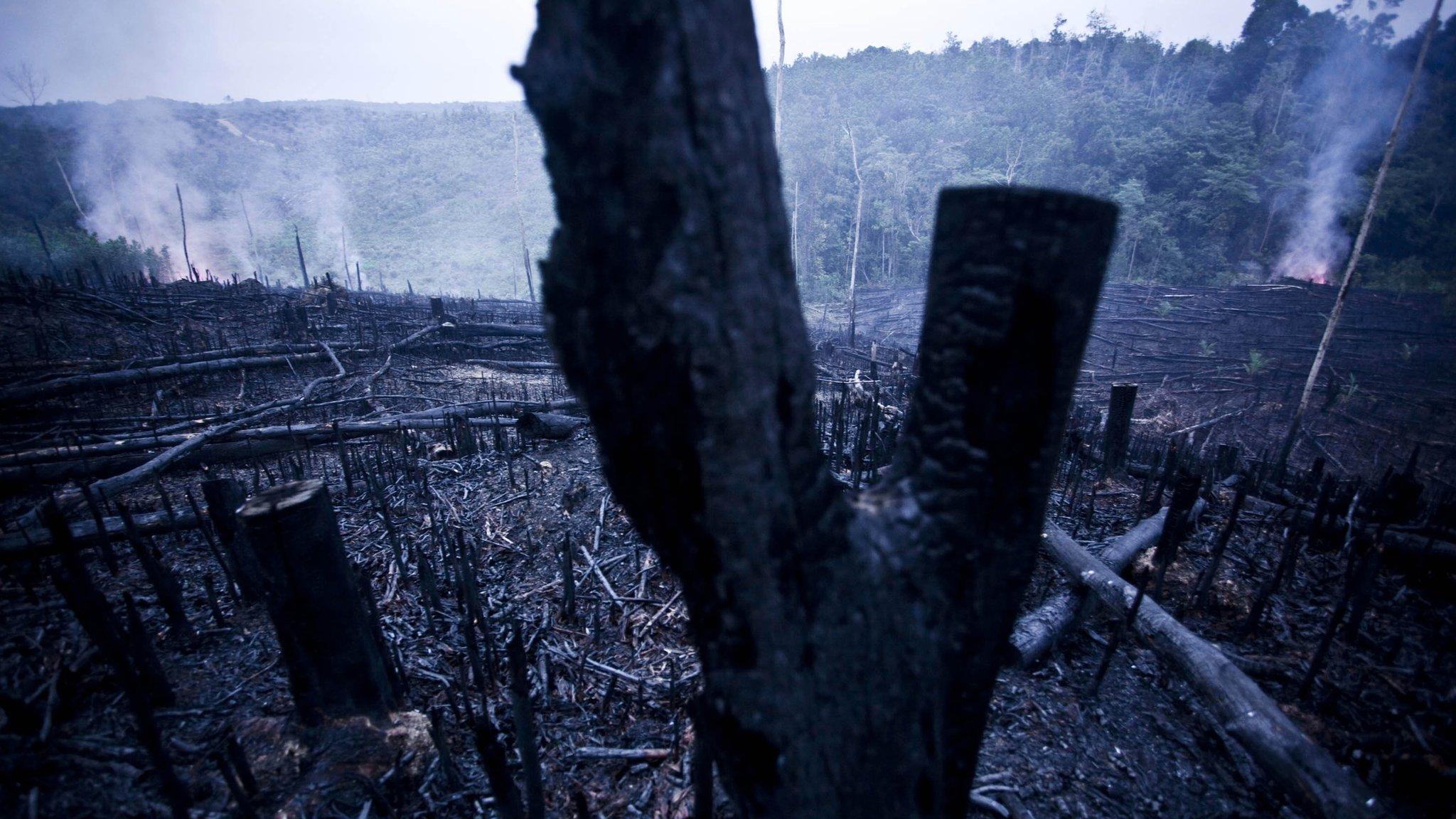
- Published25 October 2024
